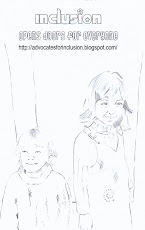In the ordinary day to day life most people don't think about inclusion. So sometimes I think the term has become jargon and other common-experience type of folk have no idea what we're on about.
It does come down to some basic human needs that most people also don't have thoughts or conversations about: the feeling that you belong, that you're valued and wanted, that you have a role and relationships, you're part of what's going on. For some people the experience of being left out, overlooked or unwanted is a common experience. These people are 'marginalised' obviously, and this needs to be addressed for our communities to be a better place.
So my challenge is to see how I can connect with someone, make a new friend perhaps, employ a new staff member or just say hi in the street, to someone who may have otherwise been overlooked today. Why would I do this? I have been challenging myself to being open to receiving what others have to offer. I have found that if I don't, I might miss out on my next best friend, mentor, conversation, smile or hug. So why not.
Inclusion begins with each of us.
Saturday, November 14, 2009
Saturday, November 7, 2009
Consumerism
This thought was triggered by attending the Inclusive Education Conference: Making it Happen at Te Papa, Wellington, New Zealand in September 2009. Professor Tony Booth and Professor Roger Slee were keynote speakers. Real Inclusion is almost infinite, so the discussion starts simply with this idea.
Imagine a centralised database where all your purchases and consumption are assigned a value based on their real cost: to society, the environment, human mental and physical health and the cost to peoples human rights.
Once you start going over a certain threshold of load (the value you are allocated is based on your global socio economic rating) you are taxed more.
To be eligible for this tax you have to be part of an electronically
The equity aspect is addressed by the nature of the model. The more money you have, the more you consume, the more you contribute to you life footprint liability.
Labels:
Consumerism,
Global Taxation
Subscribe to:
Comments (Atom)
